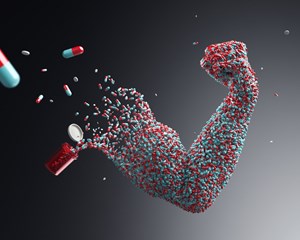(单词翻译:单击)
中英文本
Other estimates suggest even higher numbers. A paper published in 2011 examined the prevalence of "blood doping", a catch-all term for ways to increase the capacity of blood to ferry oxygen to muscles. The researchers analysed samples from more than 2,700 athletes and concluded that 14% were probably guilty (though the tests fell short of explicit proof). That average concealed wide variations. Some countries had prevalence rates as high as 48%, though the researchers diplomatically refused to name the alleged offenders.
其他估计数字甚至更高。2011年发表的一篇论文调查了“血液兴奋剂”的流行情况。“血液兴奋剂”是一个笼统的术语,指的是增加血液向肌肉输送氧气的能力。研究人员分析了2700多名运动员的样本,得出的结论是14%的运动员可能有罪(尽管测试缺乏明确的证据)。这个平均值掩盖了很大的差异。一些国家的流行率高达48%,尽管研究人员委婉地拒绝说出被指控的罪犯的名字。
Another study, published in 2018, simply asked more than 2,000 athletes whether they were doping. The data were collected in 2011 at two big competitions—the World Championships in Athletics and the Pan-Arab Games. To encourage honest responses, the researchers used what is called the randomised-response technique. This guarantees individual answers will remain anonymous and untraceable. They concluded that 43.6% of the athletes surveyed had doped in the past year. Translated to Tokyo, that would imply around 4,800 drug-boosted competitors—roughly in line with Mr Chalmers' fears.
2018年发表的另一项研究只简单询问了2000多名运动员是否服用了兴奋剂。这些数据收集于2011年两大赛事——世界田径锦标赛和泛阿拉伯运动会。为了获得真实的回答,研究人员使用了所谓的随机反应技术,确保了个人的回答将保持匿名和不被追踪。他们得出的结论是,有43.6%的受访运动员在过去一年中服用过兴奋剂。换作在东京奥运会的话,这意味着大约有4800名运动员服用了兴奋剂,该结论与查尔默斯先生的担忧大致相符。

But all these estimates are just that: estimates. "My gut feeling, from having worked with many Olympic-level athletes, is that the randomised-response numbers are too high," says Yorck Olaf Schumacher, who helped develop the Athlete Biological Passport (ABP), a widely used anti-doping test that tracks blood readings, looking for suspicious changes. Some athletes may not have understood the question properly, he says, or may have confused legitimate dietary supplements with doping.
但所有这些估计都只是估计。“我和许多奥运会水平的运动员一起工作过,我的直觉是随机反应的数字太高了,”帮助开发了运动员生物护照(ABP)的约克·奥拉夫·舒马赫说。运动员生物护照是一种被广泛使用的反兴奋剂测试,可以跟踪血液读数,寻找可疑的变化。他说,一些运动员可能没有正确理解这个问题,或者可能把合法的膳食补充剂和兴奋剂混淆了。
Athletes dope because drugs offer big advantages—potentially so big that undoped rivals have no hope of matching them. WADA, the rules of which bind many sports, maintains a list of hundreds of banned substances. They range from obscure chemicals with names like IGF-1 LR3 and AOD-9604 to insulin (to boost muscle size), amphetamines (for their stimulating effects) and even diuretics (used to mask the presence of other drugs). The clandestine nature of doping means that, for most drugs, there is little hard evidence for their effect on performance. Athletes are forced to rely instead on locker-room rumours and "street knowledge", says Chris Cooper, a sports scientist at the University of Essex, much of which will probably be exaggerated. But for some of the best-known drugs, science—and history—can give a sense of the advantages on offer.
运动员服用兴奋剂是因为药物提供了巨大的优势——潜在的优势是如此之大,以至于未服用兴奋剂的竞争对手无法匹敌。世界反兴奋剂组织(WADA)制定了一份包含数百种违禁物质的清单,该清单约束了许多运动项目。它们种类繁多,从名称模糊的化学物质,如IGF-1 LR3和AOD-9604,到胰岛素(增加肌肉体积),安非他命(具备刺激作用),甚至利尿剂(用于掩盖其他药物的存在)。兴奋剂的隐秘性质意味着,对于大多数药物来说,几乎没有确凿的证据能够表明它们对成绩有影响。埃塞克斯大学的体育科学家克里斯·库珀表示,运动员们被迫依赖于更衣室谣言和“街头知识”,其中很多可能会被夸大。但是对于一些最著名的药物来说,科学和历史可以让我们知道它所提供的优势。
译文由可可原创,仅供学习交流使用,未经许可请勿转载。
词语解释
1.catch-all 笼统的
Indigestion is a catch-all term for any kind of stomach distress.
“消化不良”是个笼统的术语,可以指各种胃部不适。
2.in line with 与……一致
Wage increases must be in line with inflation.
工资的增长必须与通货膨胀率一致。
3.clandestine 暗中从事的
The jury didn't know about the money and support Hale had been receiving from a clandestine effort known as the Arkansas Project.
陪审团并不知道黑尔从一个叫做“阿肯色计划”的秘密项目中得到了金钱和支持。
4.confuse with 混淆
Don't confuse liberty with license.
不要把自由与放纵混为一谈。


